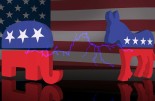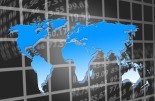Harry Geels: Trump's policies are leading to chaos, but he does have a point
Harry Geels: Trump's policies are leading to chaos, but he does have a point

This column was originally written in Dutch. This is an English translation.
By Harry Geels
Trump's trade war is chaotic and counterproductive, but he does raise a real and structural problem that many countries and economists are remarkably ignoring.
During the first 100 days of his presidency, Donald Trump has succeeded in one thing: drawing all attention to himself. The low point was his playful announcement of import tariffs, based on naive economic logic. Now, under pressure from the American business community and poor stock market performance, he seems to be slowly changing course. This could have a positive effect in the coming period, but more on that later.
Let's not forget that behind the chaotic policy lies a legitimate point: the enormous trade imbalance between the US and the rest of the world. The US imports much more than it exports, especially cheap products from China. In the long term, this is not sustainable. Trump is addressing a serious problem, for four reasons.
Four valid points behind Trump's policy
Firstly, unfair trade practices. Many countries have been imposing import tariffs and other barriers against the US for years, especially China, India, and the EU. Think, for example, of how the EU protects its agricultural sector. It is understandable that Trump is taking extra harsh measures against China, especially given the artificially low renminbi exchange rate, even though the renminbi is about the only currency that has become stronger than the dollar (in a controlled manner) since the credit crisis.
Secondly, state capitalism in China. Many companies there are wholly or partly state-owned and receive direct or indirect support. Western companies that want to operate in China are often forced to transfer technology or relocate production. The WTO rules are inadequate in this respect.
Thirdly, strategic sectors are coming under pressure. As the world increasingly retreats into economic and political blocs, accelerated by the coronavirus pandemic, the importance of having access to steel, semiconductors, and scarce raw materials is growing. The raw materials deal that Trump is pursuing with Ukraine should be seen in this light. This move will also make such products more expensive and will therefore ultimately lead to structural inflation.
Fourthly, the structural trade deficit of the US is leading to enormous dollar reserves worldwide, only part of which are being reinvested in the US. The deficit is financed by debt: foreign parties buy US debt securities. If confidence in the dollar or in US public finances declines, there is a risk of dangerous capital flight and ultimately a dollar crisis and possibly also an interest rate shock.
Downplaying Trump's arguments
Many economists downplay the above risks. This is understandable: people would rather continue trading with the affluent US market. The advantages for US consumers, who benefit from cheap imported products, are also often pointed out. However, economic logic dictates that if a country has a structural current account deficit, its currency must weaken. This makes domestic products cheaper and foreign products more expensive, restoring the balance.
However, this process is not working sufficiently. On the one hand, competing currencies are weak (the euro due to internal problems). On the other hand, unfair trade practices continue to exist. Moreover, thanks to the economic and military hegemony of the US, the dollar remains the dominant reserve currency. For Trump, it is a losing battle.
It was striking how often videos of Ronald Reagan and Milton Friedman appeared on social media in recent months as counterparts to Trump's policies. Both were outspoken advocates of free trade. Friedman even argued that unfair trade practices, such as subsidies, were beneficial: 'Why should we complain when other countries give us gifts?'
Ironically, Reagan and Friedman were seen for decades as figureheads of 'evil' neoliberalism. Now they are suddenly being held up as moral compasses. Things can change. To be clear, Reagan and Friedman were largely right: free world trade works, provided that internal relations are in order.
And what now?
Trump is now facing increasing headwinds from the American business community. It seems unlikely that he will be able to force major concessions from countries such as China. However, some minor 'successes' have been achieved: Mexico, Canada, and Japan have shown themselves willing to renegotiate trade agreements.
Trump will undoubtedly sell these small victories as major triumphs. And he will probably be satisfied with that, although with Trump it is always difficult to predict. Nevertheless, a much more fundamental problem remains: America's spending addiction. Both consumers and the government are structurally living beyond their means. Americans spend more than they produce; the difference is imported, not only in goods but also in capital.
Normally, such a situation corrects itself through a weaker currency. This is not happening sufficiently at present. China is the mirror image: the country saves a lot (around 40% of GDP) and produces more than it consumes. China also realises that this is not sustainable in the long term and is trying to stimulate domestic consumption. Trump, it seems, is not paying enough attention to this for the time being.
Finally: a philosophical reflection
Trump co-authored The Art of the Deal and seems to want to live by its principles. But perhaps he should focus more on Sun Tzu's The Art of War. Sun Tzu states: 'The greatest victory is achieved without war.' Or maybe it's time for Trump to become even more philosophical. As Leo Tolstoy once put it so well: 'Everyone thinks they can change the world, but no one thinks they can change themselves.'
This article contains the personal opinion of Harry Geels.









